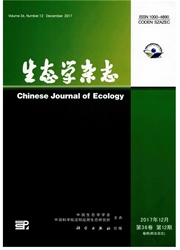

 中文摘要:
中文摘要:
采用盆栽试验,研究了不同镉(Cd)浓度胁迫下忍冬科荚蒾属珊瑚树(Viburnum odoratissimum)和地中海荚蒾(V.tinus)2种园林树种3年生苗木叶片受伤害形态特征及生理生化指标(叶绿素、丙二醛、可溶性糖及可溶性蛋白含量、电解质渗透率、过氧化物酶活性)的变化,并分析了植株各营养器官(根、茎、叶)Cd的富集水平。结果表明:Cd对珊瑚树叶片生长及生理生化指标均未产生显著影响;地中海荚蒾在Cd胁迫浓度为100mg.kg^-1时出现伤害症状,电解质渗透率增加,丙二醛含量增加,叶绿素含量减少;而当胁迫浓度提高到400mg.kg^-1时,植株叶片枯黄,植株萎蔫,生长势差;2种植物地下部富集量均大于地上部,可以推断珊瑚树和地中海荚蒾对土壤中Cd具有一定的富集能力,在土壤镉污染严重地区栽植具有重要意义。
 英文摘要:
英文摘要:
A pot experiment was conducted to study the effects of different Cd concentrations on the leaf morphology and physiological and biochemical indices of 3-year-old Viburnum odoratissimum and V. tinus seedlings, and the Cd accumulation in their roots, stems, and leaves. Cadmium stress had no significant effects (P0.05) on the leaf physiological and biochemical indices of V. odoratissimum. However, under stress of 100 mg.kg^-1 CdCl2, the V. tinus seedling’s leaves were damaged. Their electrolyte leakage and MDA content increased, while chlorophyll content decreased. When the Cd stress reached 400 mg.kg^-1, the leaves scorched, plants wilted, and the growth potential turned weak. For the two plant species, the Cd content in roots was higher than that in leaves and stems, suggesting that both V. tinus and V. odoratissimum had definite potential in enriching soil Cd. Compared with V. tinus, V. odoratissimum had stronger tolerance to Cd stress, and could be planted on the soils seriously polluted by Cd.
 同期刊论文项目
同期刊论文项目
 同项目期刊论文
同项目期刊论文
 期刊信息
期刊信息
